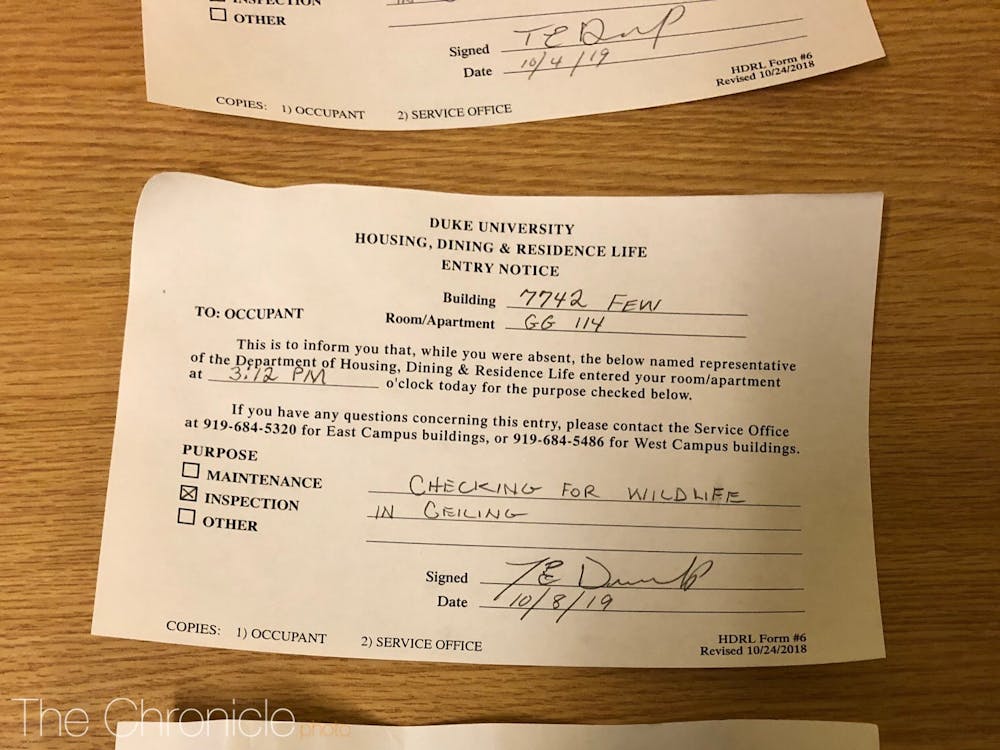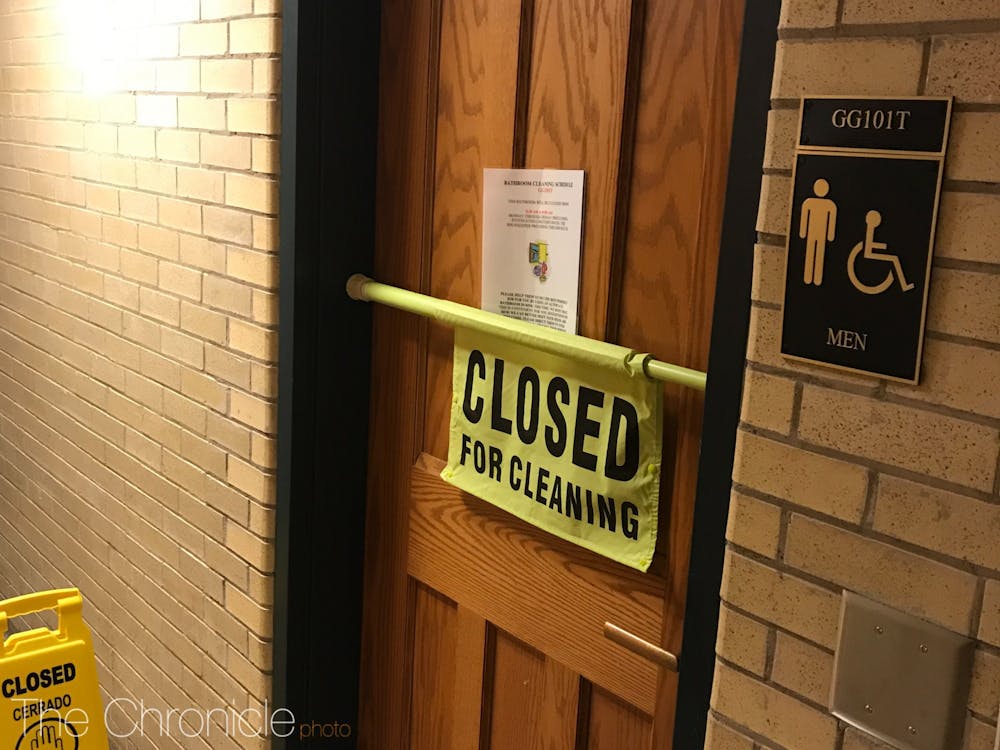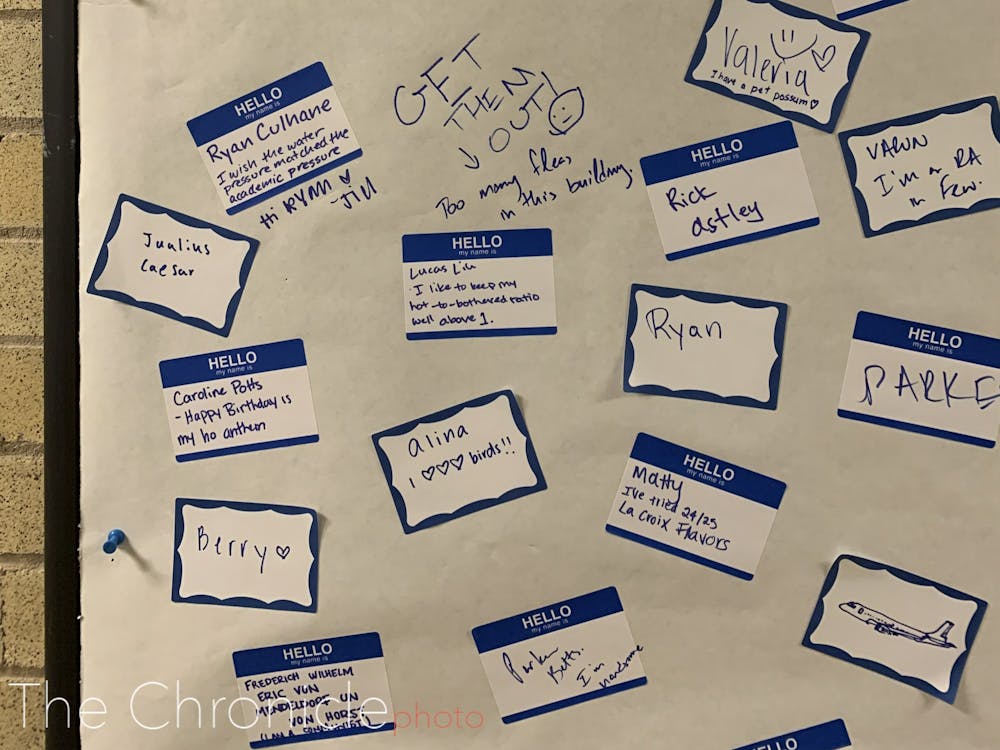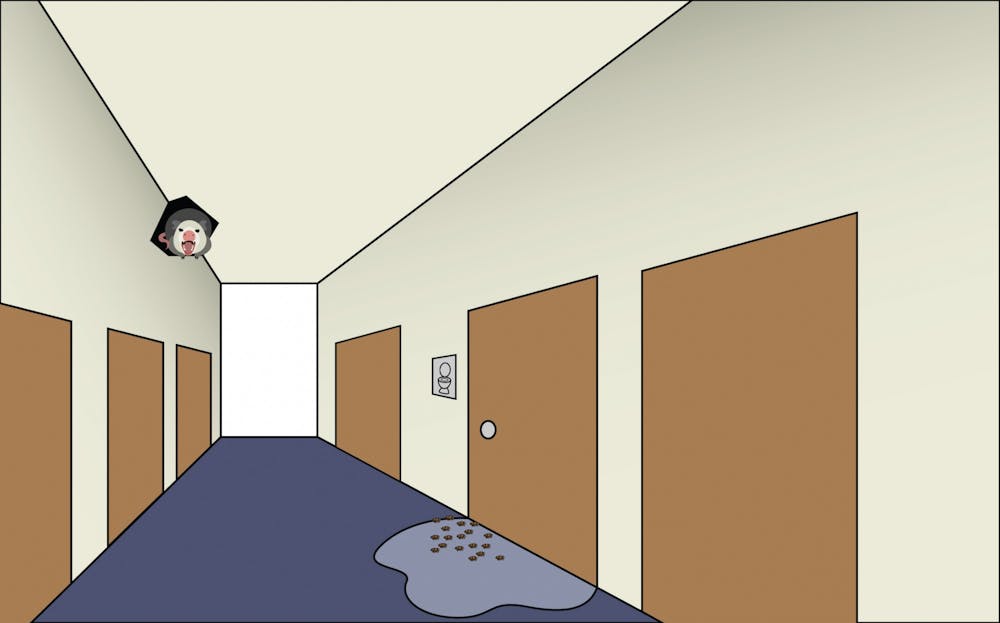Residents of Few Quad have had some unwelcome guests this fall.
An opossum began living in the ceiling of the first floor of Few GG in late September, residents said, and the problem grew worse in October when fleas infested two first-floor bathrooms and multiple dorm rooms. The opossum remains at large, and one of the bathrooms was closed as of Sunday evening for another round of flea treatment.
“I think Few is cursed,” said junior Valeria Silombria, one of the Few GG residents over whose room the opossum roamed. “I don’t understand.”
In an email to The Chronicle, Joe Gonzalez—assistant vice president of student affairs and dean for residential life—emphasized residents’ role in addressing Few’s wildlife problems.
“Housing & Residence Life continues to address the situation and appreciates the assistance we are receiving from the impacted community,” he wrote. “Their continued diligence in reporting problems to us quickly is an important factor in ending this problem.”

Opossum by night
Senior Grace Smith and her roommate first heard an animal in the air vent above their dorm Sept. 24, Smith said, though they originally thought it was a rat. Silombria and her roommate started hearing sounds around the same time, and both roommate pairs submitted a work order to Housing and Residence Life.
Workers tried several strategies to capture the animal, first putting tape in the ceiling space above the closets in the two rooms, Silombria and Smith said, but to no avail.
On Oct. 3, Smith’s roommate lifted a ceiling tile and came face to face with the culprit—not a rat, but an opossum. She invited Silombria to come see.
“She lifts her ceiling, and there’s literally an opossum right there,” Silombria said. “The opossum looked really scared.”
Workers came with the mission of “checking for wildlife in ceiling,” according to student room entry notices dated Oct. 4 and 8 that were obtained by The Chronicle. However, Smith wrote in an email that it took until Oct. 15 for pest control company Critter Control to put a cage in the ceiling.
Workers left the cage there for around a week and frequently checked it, Smith and Silombria said, but the opossum evaded capture.
Silombria explained that the opossum was an “added stressor” as she and her roommate studied for midterms, and she was worried about sanitation.
“It’s in the air vent, and we’re breathing the air, and then we couldn’t figure out what it was eating or where it was pooping,” she said.
Not wanting to deal with the stress, Silombria spent around two weeks in a temporary room in Edens Quad. She moved back to Few Oct. 28, a few days after the cage was removed.
In contrast, Smith said that the animal did not bother her and her roommate too much.
“We weren’t very freaked out because [opossums] don’t have rabies,” she said. Smith added that she and her roommate would bang on the ceiling when the opossum was loud, driving it away.
Get The Chronicle straight to your inbox
Sign up for our weekly newsletter. Cancel at any time.
Meanwhile, the residents have not heard the opossum since late October, and its whereabouts remain unknown.
“I hope he’s happy outside,” Silombria said. “There are other opossums outside of Few, so he should be joining his family soon, hopefully.”
A bug’s life
As the hunt for the opossum was winding down, a new kind of fauna made its way to Few Quad.
On Oct. 26, sophomore Parker Betts, a resident assistant in Few GG, wrote in a GroupMe message obtained by The Chronicle that his residents should stay out of the bathroom on his side of the hall. Betts declined to comment to The Chronicle.
An explanation came three days later, when Gonzalez wrote in an email to residents that fleas had been found in Few GG101T and HH101T, both men’s bathrooms.
In the email, Gonzalez directed students to use other restrooms until the rooms had been treated by Ecolab, a company that offers “pest elimination,” among other services. He wrote that students should notify the housing office of “flea activity on their person or in their rooms” and check service and assistance animals for fleas. He also requested that students tell the housing office if they had had a pet in their room this semester.
Students who admitted to having pets in their rooms, which is not allowed at Duke, would not face disciplinary action, Gonzalez wrote.
Sophomore Wilmer Garcia and senior Kinza Khan, both residents of Few GG, said that they had fleas in their rooms. Garcia found bites on his leg several days before Betts sent out his GroupMe message, and Khan’s roommate found red marks on her foot while Khan was out of town for an interview the night of Oct. 30.
Flea traps were installed in their rooms, devices consisting of a lamp and a sticky base to trap fleas that jumped into the light.
“Over time, it was like a flea farm,” Garcia said of the trap in his room. “I would move it, it looked like a chocolate chip cookie.”
Both rooms were chemically treated to deal with the fleas, Kahn’s on Nov. 1 and Garcia’s on Tuesday. HRL provided the affected residents with rooms in Edens on the days when the treatment took place, as well as trash bags and cards that let them use laundry machines for free.
Jordan Viars, residence coordinator for Few Quad, wrote in an Oct. 31 email obtained by The Chronicle that all bathrooms in Few GG were clear of “flea activity” and had been reopened. Gonzalez wrote the next day that both GG101T and HH101T had been opened.
Viars declined to comment, deferring to Gonzalez.
But the flea infestation was not over yet. On Thursday, Viars wrote in an email obtained by The Chronicle that Few GG101T had been closed again because of “the presence of 5–7 fleas in one of the sinks.” He added that Ecolab was going to treat the bathroom Friday morning, and it would be open again by noon on Saturday.
The bathroom had not been reopened as of Sunday at 8 p.m.

“Portions of the flea life cycle can sometimes survive treatments so an area can require more than one treatment,” Gonzalez wrote in an email to The Chronicle. “Fleas can also be re-introduced to an area which makes identifying the source so important.”
Gonzalez wrote that “the source of the fleas remains unknown.” The opossum might be related, he wrote, but that has not been confirmed.
“Critter Control continues efforts to capture any animals potentially related to this situation as well as seal any access points found,” he wrote.
‘The least that can be done is no fleas’
Some Few Quad residents expressed mixed feelings about Duke’s response to the opossum and the fleas.
“I guess it was frustrating in that it took so long for them to respond,” Smith said, referring to the long period of time between when the opossum was caught on video and when Critter Control put in the cage, “but the people who came to the room were always very kind.”
She added that “each individual was doing their best, if not more, and they were excited to help us go on an opossum hunt.”
Khan said that HRL had handled the fleas “pretty well,” as they responded quickly to her and her roommate’s work orders, but that the situation was “frustrating” on the whole.
“We’re paying so much money to Duke,” Khan said. “The least that can be done is no fleas, you know?”
An anonymous message also popped up in the dorm’s hallways. On a piece of paper outside Betts’ room, a photo of which was obtained by The Chronicle, someone wrote “GET THEM OUT! Too many fleas in this building.”

Silombria that she was considering applying for a housing reassignment for next semester, and she wrote in an email that Viars has been “amazing” about helping coordinate a move. Khan said that she had considered applying for reassignment, but she is taking classes part time in the spring and did not want to risk losing her housing.
Smith’s and Silombria’s roommates declined to comment for the story.
Neither the opossum nor the fleas could be reached for comment.
Matthew Griffin was editor-in-chief of The Chronicle's 116th volume.

